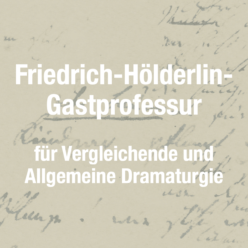Seminar in englischer Sprache / for english description see below
Alternative Dramaturgien sind politisch motiviert. In den alternativen Dramaturgien der heutigen arabischen Welt steckt das Politische nicht nur in den hitzigen Inhalten der Projekte seit dem ‚arabischen Frühling’, sondern auch und umso bedeutender in den Auseinandersetzungen über die konventionelle theatrale Form, in der neubelebten Thematisierung dramaturgischer Funktionsweisen und der Beziehung zum Publikum… Der Rückgriff auf persönliche Geschichten im Kontext des revolutionären Frühlings ist ebenso politisch: das Persönliche ist politisch. Das Theater in den Länder nach dem ‚Arabischen Frühling’ bleibt weiterhin ein Forum, um dominante Dramaturgien von Kohärenz und Konsens in Frage zu stellen. Trotz des Aufstiegs von Islamisten und anderen konservativen Mächten in der Region, enthüllen die Nachwirkungen der Revolution gegensätzliche „ Interpretations-Gemeinschaften“. Der kulturelle Konservatismus und insbesondere seine Beziehung zu den Künsten werden seit neuestem intensiv debattiert. Im Mittelpunkt der Diskussionen standen dabei die ‚Verunreinigung’ des Theaters durch die visuellen Künste und vor allem die ‚Obszönität’ des neuen Theaters. Die Rolle von Theater und Performance in der Öffentlichkeit war ebenfalls Thema der öffentlichen Debatte seit dem Arabischen Frühling. Die politischen Motivation hinter der exzessiven „Mediaturgie“ von Theaterproduktionen und die ewigen Verflechtungen zwischen Theater, visuellen Künsten und Medien – die sich gegenseitig sowohl nähren als auch kontaminieren – wurden hitzig diskutiert.
Ziele des Seminars:
Im Seminar untersuchen wir Theater-Performances aus den sogenannten Ländern des Arabischen Frühlings, die von visueller Dramaturgie und digitalen Produktionsabläufen durchdrungen wurden. Die Tendenz zu turbulenten Schwellenerfahrungen, die uns einladen, uns zu beteiligen statt passive Konsumenten zu sein, wird erfahrbar in den Theateraufführungen und Performances von Jaàfer Guesmi und Radhouane El Meddeb aus Tunesien, Asmaa Houri, Jaouad Sonnani, Abdelmajid El Haouasse und Youssef Rayhani aus Marokko, Lina Saneh und Rabih Mroué aus dem Libanon und weiteren unabhängigen Theatergruppen aus z.B. Ägypten und Syrien. (Um nur ein paar Beispiele von einer täglich wachsenden Liste zu nennen.)
Alternative dramaturgies are shaped by political motivations. The political in these exemplary alternative dramaturgies from the Arab world today lies not only in the projects’ hot issues pertaining to the Spring of Democracy but also and most importantly in disputing the conventional theatrical form, re-thematizing the dramaturgical operation modes and the relation to the audience… Their recourse to personal stories within the context of the revolutionary spring is also political: the personal is political. Theatre in Post-Arab Spring countries continues to be a forum used to challenge dominant dramaturgies of coherence and consensus. Even so, the aftermath of the Spring, with the rise of the Islamists and other conservative tides in the region, exposes conflicting ‘communities of interpretation’. The public articulation of cultural conservatism and particularly its relationship with the arts has recently been subject to more thorough reflection in public debate. Questions related to Theatre’s contamination by visual arts and even more, obscenity in the new theatre were at the heart of our discussions. The role of Theater and Performance in the public sphere was also a key issue along with the shifting terms of post-Arab-Spring public debates. The political motivations behind the excess of ‘mediaturgy’ in the Post-Arab Spring theatre productions and the perpetual interweaving between theatre and visual arts and media —whereby each feeds and contaminates the other- were all at the heart of heated discussions.
Course Objectives: The Seminar investigates theatrical performances from the countries of the so called ‘Arab Spring’ that have become contaminated by visual dramaturgy and digital workflows. The tendency to privilege the turbulent reflection of liminal experience, where we are invited to become co-artists rather than passive consumers, becomes so apparent in the theatres and performances of Jaàfer Guesmi and Radhouane El Meddeb from Tunisia, Asmaa Houri, Jaouad Sonnani, Abdelmajid El Haouasse, and Youssef Rayhani from Morocco, Lina Saneh and Rabih Mroué from Lebanon, and many independent theatre companies from Egypt, Syria… (To state just a few from a long list that is growing every day.)…
Termine: Mi. 12-14 h – an folgenden Tagen:
- 25.10., 12-14 h (erste Sitzung)
- 6.12., 12-14 h
- 13.12., 12-14 h
- 20.12., 12-14 h
- 10.01., 12-14 h
- 17.01., 12-14 h
- 24.01., 12-14 h
- 31.01., 12-14 h
- 7.02., 12-14 h
- + Block-Veranstaltungen am Fr. 27.10., 10-14 Uhr +
- Fr., 19.01., 10-14 +
- Sa. 20.01., 10-14
Possible Preparatory Readings:
- Khalid Amine & George Roberson, eds., Intermediality, Performance, and the Public Sphere. Denver, Amherst and Tangier: International Collaboration Series, 2014.
- Khalid Amine & George Roberson, eds., Alternative Dramaturgies, Denver, Amherst and Tangier: International Collaboration Series, 2015.
- Walter Benjamin (1936), “The Work of Art in the Age of Mechanical Reproduction”.
- Edward Ziter, Political Performance in Syria from the Six –Day War to the Syrian Uprising (Palgrave, 2015).
